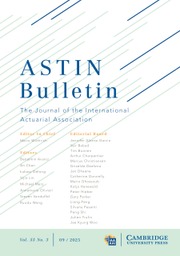Crossref Citations
This article has been cited by the following publications. This list is generated based on data provided by
Crossref.
Mack, Thomas
1993.
Distribution-free Calculation of the Standard Error of Chain Ladder Reserve Estimates.
ASTIN Bulletin,
Vol. 23,
Issue. 2,
p.
213.
Gogol, Daniel
1993.
Using expected loss ratios in reserving.
Insurance: Mathematics and Economics,
Vol. 12,
Issue. 3,
p.
297.
Mack, Thomas
1994.
Which stochastic model is underlying the chain ladder method?.
Insurance: Mathematics and Economics,
Vol. 15,
Issue. 2-3,
p.
133.
Schmidt, Klaus D.
and
Schnaus, Anja
1996.
An Extension of Mack's Model for the Chain Ladder Method.
ASTIN Bulletin,
Vol. 26,
Issue. 2,
p.
247.
Taylor, Greg
2000.
Loss Reserving.
Vol. 21,
Issue. ,
p.
43.
Liu, Huijuan
and
Verrall, Richard
2009.
Predictive Distributions for Reserves which Separate True IBNR and IBNER Claims.
ASTIN Bulletin,
Vol. 39,
Issue. 1,
p.
35.
Ohlsson, Esbjörn
and
Lauzeningks, Jan
2009.
The one-year non-life insurance risk.
Insurance: Mathematics and Economics,
Vol. 45,
Issue. 2,
p.
203.
Liu, Huijuan
and
Verrall, Richard
2009.
A Bootstrap Estimate of the Predictive Distribution of Outstanding Claims for the Schnieper Model.
ASTIN Bulletin,
Vol. 39,
Issue. 2,
p.
677.
Antonio, Katrien
and
Plat, Richard
2010.
Micro-Level Stochastic Loss Reserving.
SSRN Electronic Journal,
Plat, Richard
2010.
Essays on Valuation and Risk Management for Insurers.
SSRN Electronic Journal,
Gismondi, Fulvio
Janssen, Jacques
and
Manca, Raimondo
2012.
The construction of the claims reserve distribution by means of a semi-Markov backward simulation model.
Annals of Actuarial Science,
Vol. 6,
Issue. 1,
p.
23.
2012.
Stochastic Claims Reserving Methods in Insurance.
p.
409.
Schmidt, Klaus D.
2012.
Loss prediction based on run-off triangles.
AStA Advances in Statistical Analysis,
Vol. 96,
Issue. 2,
p.
265.
Antonio, Katrien
and
Plat, Richard
2014.
Micro-level stochastic loss reserving for general insurance.
Scandinavian Actuarial Journal,
Vol. 2014,
Issue. 7,
p.
649.
Faires, Hafedh
2015.
The Stochastic Error Rate Estimation of Prediction Distributions.
Journal of Mathematical Finance,
Vol. 05,
Issue. 02,
p.
172.
Badescu, Andrei
Lin, Xiaodong Sheldon
and
Tang, Dameng
2015.
A Marked Cox Model for the Number of IBNR Claims: Theory.
SSRN Electronic Journal ,
Ohlsson, Esbjörn
2016.
Unallocated loss adjustment expense reserving.
Scandinavian Actuarial Journal,
Vol. 2016,
Issue. 2,
p.
167.
Badescu, Andrei L.
Lin, X. Sheldon
and
Tang, Dameng
2016.
A marked Cox model for the number of IBNR claims: Theory.
Insurance: Mathematics and Economics,
Vol. 69,
Issue. ,
p.
29.
Wuthrich, Mario V.
2017.
Neural Networks Applied to Chain-Ladder Reserving.
SSRN Electronic Journal ,
Landriault, David
Willmot, Gordon E.
and
Xu, Di
2017.
Analysis of IBNR claims in renewal insurance models.
Scandinavian Actuarial Journal,
Vol. 2017,
Issue. 7,
p.
628.


